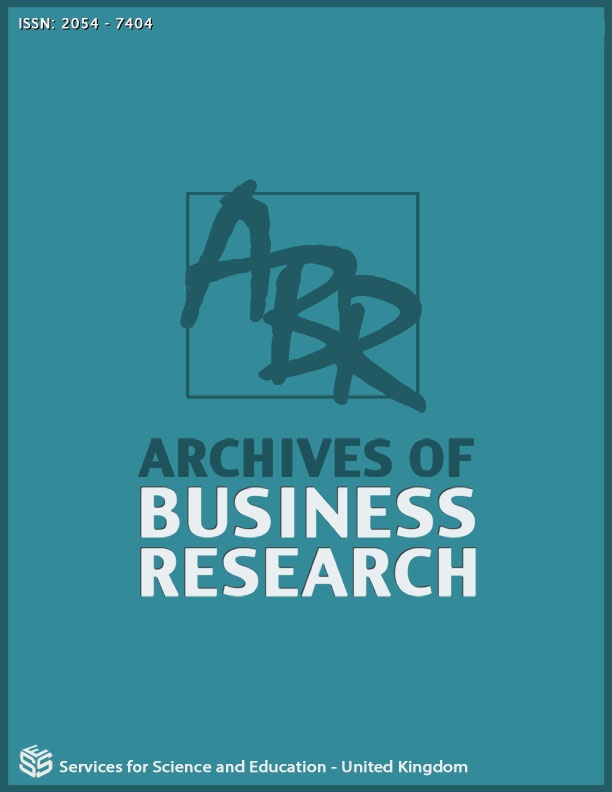The Reexamination of Geographic Earnings Conservatism
DOI:
https://doi.org/10.14738/abr.108.12910Keywords:
domestic earnings, foreign earnings, conservatism, persistenceAbstract
U.S. Multinational corporations are operated in many different countries. Their foreign and domestic earnings are separately reported in the annual report. This paper examined the difference between domestic and foreign earnings in terms of conservatism using a variety of model specifications for conservatism. I found that the degrees of conservatism of domestic earnings are much higher than foreign earnings in all the model specifications for conservatism, which is in line with prior literature (Hwang and Kim 2022). More importantly, I found that the higher financial leverage, the declining asset growth and the higher information asymmetry significantly increase the level of conservatism of domestic earnings rather than foreign earnings.
References
Ball, R., and L. Shivakumar. 2005. Earnings quality in UK private firms: comparative loss recognition timeliness. Journal of Accounting and Economics 39 (1):83-128.
———. 2006. The Role of Accruals in Asymmetrically Timely Gain and Loss Recognition. Journal of Accounting Research 44 (2):207-242.
Basu, S. 1997. The conservatism principle and the asymmetric timeliness of earnings. Journal of Accounting and Economics 24 (1):3-37.
Bodnar, G. M., L.-S. Hwang, and J. Weintrop. 2003. The Value Relevance of Foreign Income: an Australian, Canadian, and British Comparison. Journal of International Financial Management & Accounting 14 (3):171-193.
Bodnar, G. M., and J. Weintrop. 1997. The valuation of the foreign income of US multinational firms: a growth opportunities perspective. Journal of Accounting and Economics 24 (1):69-97.
Cahan, S. F., and Wei Zhang. 2006. After Enron: Auditor Conservatism and Ex-Andersen Clients. Accounting Review 81 (1):49-82.
Cateora, P, and John Graham. 2007. International Marketing. MacGraw-Hill International Edition 13th Edition.
Christophe, S. E. 2002. The Value of U.S. MNC Earnings Changes from Foreign and Domestic Operations. Journal of Business 75 (1):67-93..
Denis, D. J., D. K. Denis, and K. Yost. 2002. Global Diversification, Industrial Diversification, and Firm Value. Journal of Finance 57 (5):1951-1979.
Dietrich, J. R., Muller, K. A., and Riedl, E. J. (2007). Asymmetric Timeliness Tests of Accounting Conservatism. Review of Accounting Studies 12: 95–124.
Elliott, J. A., and J. D. Hanna. 1996. Repeated Accounting Write-Offs and the Information Content of Earnings. Journal of Accounting Research 34 (Studies on Recognition, Measurement, and Disclosure Issues in Accounting):135-155.
Francis, J., J. D. Hanna, and L. Vincent. 1996. Causes and Effects of Discretionary Asset Write-Offs. Journal of Accounting Research 34 (Studies on Recognition, Measurement, and Disclosure Issues in Accounting):117-134.
Givoly, D., C. K. Hayn, and A. Natarajan. 2007. Measuring Reporting Conservatism. Accounting Review 82 (1):65-106.
Hayn, C. 1995. The information content of losses. Journal of Accounting and Economics 20 (2):125-153.
Hope, O.-K., and W. B. Thomas. 2008. Managerial Empire Building and Firm Disclosure. Journal of Accounting Research 46 (3):591-626.
Hwang, L. S., and M. I. Kim. 2022. Earnings Conservatism and Repatration Tax Cost. Korean Accounting Review 47(3): 103-138.
LaFond, R., and R. L. Watts. 2008. The Information Role of Conservatism. Accounting Review 83 (2):447-478.
Lara, J.M.G., Osma, B.G. and F. Penalva. 2009. Accounting Conservatism and Corporate Governance. Review of Financial Studies 14:161-201.
Petersen, M. 2009. Estimating Standard errors in Finance Panel Data Sets: Comparing Approaches. Review of Financial Studies 22:435-480.
Riedl, E. I. 2004. An Examination of Long-Lived Asset Impairments. Accounting Review 79 (3):823-852.
Roychowdhury, S., and R. L. Watts. 2007. Asymmetric timeliness of earnings, market-to-book and conservatism in financial reporting. Journal of Accounting & Economics 44 (1/2):2-31.
Thomas, W. B. 1999. A test of the market's mispricing of domestic and foreign earnings. Journal of Accounting & Economics 28 (3):243-267.
Watts, R. L. 2003a. Conservatism in Accounting Part I: Explanations and Implications. Accounting Horizons 17 (3):207-221.
———. 2003b. Conservatism in Accounting Part II: Evidence and Research Opportunities. Accounting Horizons 17 (4):287-301.
Downloads
Published
How to Cite
Issue
Section
License
Copyright (c) 2022 Myung-In Kim

This work is licensed under a Creative Commons Attribution 4.0 International License.






